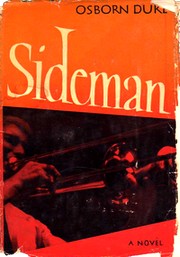 I probably would have filed Sideman under “Justly Neglected” if it weren’t for the fact that it’s about a trombone player in a big band. As an occasional trombone player in a big band myself, I had to give this book a couple of bonus stars.
I probably would have filed Sideman under “Justly Neglected” if it weren’t for the fact that it’s about a trombone player in a big band. As an occasional trombone player in a big band myself, I had to give this book a couple of bonus stars.
Sideman portrays a few weeks in the life of Bernie Bell, a trombonist who drops out of college in Texas to take a job with Matt MacNeal’s big band. MacNeal’s band is in the midst of an extended gig at a dance hall near the Pacific Park pier in Santa Monica. Bell’s real reason for joining the band is the chance to study with an Arnold Schoenberg-like modernist composer living in L.A..
Even though the novel comes in at close to 450 pages, the world it describes is a microcosm. All the scenes take place in one of a half-dozen or so sites–the dance hall, the hotel where most of the band members stay, the shack Bernie rents so he can compose on an old piano–close to Santa Monica Beach. Aside from a few marginal characters, most of the interaction is among a few of the band members and a couple of their wives. Although Duke doesn’t lay out a clear timeline, from start to finish the story can’t take longer than four to six weeks. That much is a given, since this is the early 1950s and few working big bands had the luxury of staying off the road very long.
The plot is equally slim: Bernie arrives and tries to fit in with the other band members. He starts in on his composition studies. He gets attracted to the free-spirited wife of a fellow trombonist and agrees to write some original dance music for her. She accidentally poisons herself. Everyone starts whispering about a love triangle and the band’s manager fires Bernie. Bernie heads off to New York City to meet up with an old girlfriend. The end.
In hindsight, I’m not quite sure how Duke managed to fill up so many pages. There is a lot of talking, but not much of it is of any substance. There are lots of details about the life of a working sideman in the big band days. Duke was a trombonist himself and played with Bobby Byrne and Sammy Kaye’s bands after serving as an Army musician in World War Two. The details are probably the main reason anyone would want to pick up this book today–I suspect it’s about as accurate an account of what went on before, during, and after a typical big band performance back in their heyday. But it will linger in memory no longer than one of the lesser numbers that these bands relied on to pad out their books.
There are other autobiographical streaks in Sideman. Like his protagonist, Osborn Duke grew up in Texas and attended college in Texas. Sideman was his one and only published novel, and other than a couple of short stories and television scripts, his list of credits is short. It appears from his obituary that he spent most of his working life as a corporate writer and industrial filmmaker for General Dynamics. His papers are kept in the Special Collections of the University of North Texas, which is one of the premier centers of jazz education in the U. S..

Thank you, Olivia. It’s a privilege to do my little bit to bring some recognition to writers such as your father.
Hi Mr. Bigelow,
My father would have appreciated your very kind words and review. Thank you so much! A little funny side story, the girl that he went off to NY to be with… that was my mother, Myra McNeill Duke. She was on Your Hit Parade and one of the Ray Charles singers. NY was fabulous in the 50’s it had not become terribly expensive yet. When they had me in 58 they decided it was time to move back to both of their hometown’s, Ft. Worth, Texas. Martha Foley had a well known book that she put out every year with the new up and comming writers. Both my father and Tennessee Williams were in her book the same year. His short story was Struttin With Some Bar b Que. It was turned into a made for TV movie. Life and times were such and my father never really wrote for himself again. However his book is in every major library in the USA and I know that, that made him so very proud. Out of the five fictional books about the Big Band era I was told by a a sideman that worked with Stan Kenton, that his book is considered the best representation of the Big Band Era by most muscians. I know that my father would have been so happy. Thank you so much, Mr. Bigelow! All best wishes. Sincerely, Olivia Duke